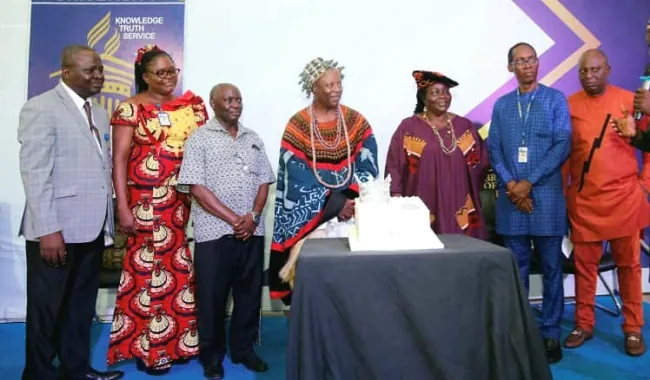

From 3rd left, Guest lecturer, Prof. Sati Fwatchak; honoree, Prof Faunkem Achankeng, his wife, Beatrice Faunkem, Head of Political Science & Public Administration, Prof. Ngozi Nwogwugwu and some others at a recent public lecture organised by the Department of Political Science and Public Administration, Babcock University, Ilisan Remo, to commemorate the 25th coronation anniversary of Faunkem, who is currently on sabbatical to the university.
A Professor of History and Dean of the Faculty of Arts, University of Jos, Sati Umaru Fwatshak, has identified impunity as a major causative factor of conflicts whether communal, tribal or international.
He gave this thought at a recent public lecture organised by the Department of Political Science and Public Administration, Babcock University, Ilisan Remo, Ogun State, to mark the 25th coronation anniversary of Professor Faunkem Achankeng I as a monarch in Southern Cameroon.
Prof Achankeng, a Political Analyst with a focus on Peace and Conflict Resolution, is a faculty member of the University of Wisconsin, Oshkosh, US, but is currently on a sabbatical at Babcock University, Nigeria.
Speaking on the theme of the event, “Peacebuilding in Traditional Institutions and Peacebuilding in the 21st Century African Societies,” the guest lecturer said, unlike general belief, it is not the absence of a law that causes conflicts but most times, impunity when people are exempted from punishment for wrongdoings.
He said there had been laws either in the traditional or the modern-day African societies to govern people across ages, but the exemption of some people from punishment because of their privileged positions in the societies was often grounds for conflicts.
He said there were lots of lessons the modern societies and leaders could learn from the traditional societies such as the Oyo Empire in Yoruba land, the ancient Kanem Bornu Empire and the Kembata Empire in Ethiopia where there were laid down rules and regulations backed by the principles of check and balance between the rulers at every level and their respective subjects. These arrangements he said, usually ensured peace and tranquillity.
He said the consequences of conflicts whether major or minor were grievous, sometimes leading to loss of life investments, displacement or deaths.
He said that is why every stakeholder, particularly political and traditional leaders must promote peaceful co-existence irrespective of tribe, race and religious differences.
He said though conflicts may be inevitable, it is only in the atmosphere of peace and harmony that meaningful development could take place anywhere in the world.
In his remark, the monarch, Professor Faunkem Achankeng, commended the organizers of the lecture, saying the memory will live with him forever.
He said his sabbatical in Babcock is a worthwhile experience that would greatly enhance his teaching as well as the impact on the lives of his students and professional colleagues.
“Africa is where I belong and making a little contribution to the African mind is the best thing I can do,” he added.
Also speaking, the President/Vice-Chancellor of Babcock University, Prof. Ademola Tayo, thanked the Department of Political Science and Public Administration for organising the lecture, saying he is particularly more enriched in knowledge about African societies then and now.
ALSO READ FROM NIGERIAN TRIBUNE
President Bola Ahmed Tinubu has declared that the federal government will soon launch a comprehensive…
As World Sickle Cell Day was marked across the globe on Thursday, medical experts have…
A Federal High Court sitting in Lagos has sentenced two British citizens, Oyedipe Andrew Adejuwon…
Chief of Naval Staff Vice Admiral Emmanuel Ogalla stated this at a briefing in the…
...had vowed to turn a new leaf and urged the court to consider a non-custodial…
Niger State government has issued a critical advisory for communities residing near riverbanks to promptly…
This website uses cookies.